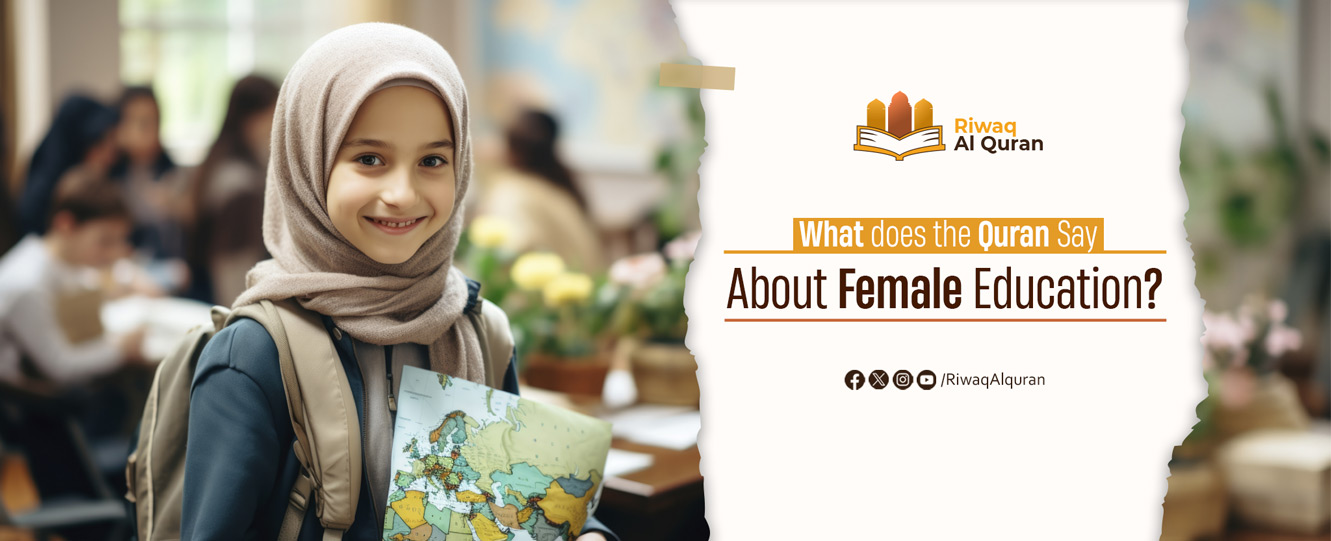Education is a fundamental aspect of Islamic teachings for both men and women. The Quran emphasizes the importance of seeking knowledge and the equal spiritual worth of both genders. In this journey, we will learn about the Islamic perspective of female education and some inspiring examples of prominent educated women of early Islam.
The Quran emphasizes the importance of seeking knowledge and the equal spiritual worth of both genders, which implicitly supports female education. Here are some key verses that highlight these principles:
Table of Contents
1. Importance of Knowledge
The Quran frequently encourages the pursuit of knowledge for all believers:
“Read in the name of your Lord who created.”
(Quran 96:1)
This verse underscores the fundamental importance of reading and seeking knowledge, applicable to both men and women.
2. Equality in Spiritual Worth
The Quran stresses the equal spiritual and moral responsibilities of men and women, which includes the pursuit of education:
“Whoever does righteousness, whether male or female, while being a believer, We will surely cause them to live a good life, and We will surely give them their reward [in the Hereafter] according to the best of what they used to do.” (Quran 16:97)
This verse affirms the equal status of men and women in their spiritual and moral duties, which encompasses the pursuit of knowledge.
3. Seeking Understanding
Believers are encouraged to seek understanding and reflect on the world around them:
“Say, ‘Are those who know equal to those who do not know?’ Only they will remember [who are] people of understanding.” (Quran 39:9)
This verse highlights the value of knowledge and understanding for all individuals.
4. The Quest for Knowledge
The Quran encourages all believers to seek knowledge and wisdom:
“And say, ‘My Lord, increase me in knowledge.'” (Quran 20:114)
This verse is a prayer for the increase of knowledge, applicable to all Muslims, men and women alike, emphasizing the continuous pursuit of learning.
5. Reflection and Understanding
The Quran calls upon all believers to reflect and understand the signs of Allah:
“Indeed, in the creation of the heavens and the earth and the alternation of the night and the day are signs for those of understanding.” (Quran 3:190)
This verse encourages both men and women to contemplate and gain an understanding of the world around them, which implies the necessity of education.


Prominent Educated Women of Early Islam
During the time of Prophet Muhammad, there were several notable women who were known for their knowledge, wisdom, and contributions to society:
1. Aisha bint Abi Bakr
Aisha, the wife of Prophet Muhammad, is perhaps one of the most well-known female scholars of Islam. She was known for her deep understanding of Islamic jurisprudence, hadith, and medicine. Aisha’s scholarly contributions are particularly significant in the compilation and preservation of hadith literature, which remains a cornerstone of Islamic jurisprudence.
2. Umm Salamah
Umm Salamah was another wife of Prophet Muhammad known for her intelligence and knowledge. She was respected for her expertise in legal matters and her ability to convey the teachings of Islam with clarity and wisdom.
3. Fatimah bint Muhammad
Fatimah, the daughter of Prophet Muhammad, exemplified piety, humility, and scholarly pursuits. She played a crucial role in transmitting religious knowledge and moral teachings to subsequent generations.
4. Khadijah bint Khuwaylid
Khadijah, the first wife of Prophet Muhammad, was a successful businesswoman and a supporter of education and learning. She provided substantial support for the early Muslim community and was known for her wisdom and foresight.
5. Hafsah bint Umar
Hafsah, the daughter of Umar ibn al-Khattab and another wife of Prophet Muhammad, was known for her literacy and intelligence. She was entrusted with the safekeeping of the first written copy of the Quran, which indicates her reliability and knowledge. Hafsah’s home became a center for learning where many Companions of the Prophet would gather to study and discuss Islamic teachings.


Learn Quran, Arabic And Islamic Studies Online With The Best Native Tutors
Riwaq Al Quran is a comprehensive online platform that offers personalized Quran, Arabic and Islamic Studies Online classes for individuals of all ages and backgrounds.
Their experienced instructors use a structured curriculum to cover Tajweed, Tafsir, and Memorization, providing easy and effective access to learning the Quran.
The advanced online classes allow for seamless communication and interaction between students and teachers. Join Riwaq Al Quran for a deeper connection with the Quran.
We offer several courses such as:
- Online courses for kids.
- Online Quran classes for kids and adults.
- Online Arabic courses
- Online Ijazah courses
- Online Islamic Studies courses.
Conclusion
The Quran promotes the pursuit of knowledge as a fundamental aspect of Islamic teachings, emphasizing its importance for both men and women. The examples of educated Muslim women during the time of Prophet Muhammad highlight the significant contributions of women to Islamic scholarship and society.
By fostering an environment that supports female education, societies can harness the full potential of women and ensure inclusive development for future generations.


































